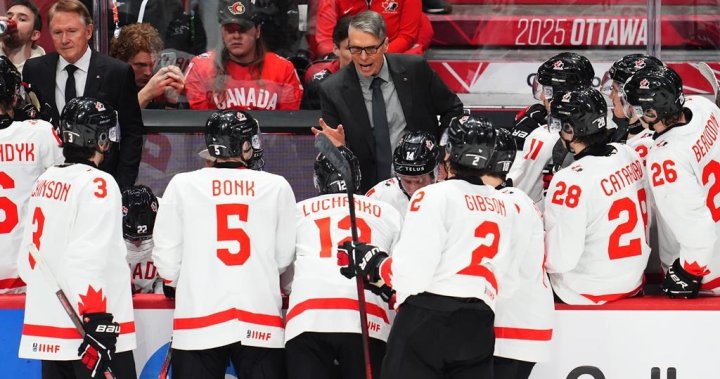Paragraph 1: The Upset and the Aftermath
The Canadian men’s under-20 hockey team, a perennial powerhouse in the World Junior Championship, suffered a shocking 3-2 shootout loss to Latvia on Friday night in Ottawa. The defeat, described as one of the worst in the program’s history, sent shockwaves through the hockey world and prompted immediate scrutiny. Latvia, a team Canada had historically dominated, pulled off the upset in front of a stunned home crowd. The loss followed a disappointing fifth-place finish in the previous year’s tournament, raising concerns about the team’s performance and preparation.
Paragraph 2: Analyzing the Game and Player Performance
Despite dominating possession and outshooting Latvia 57-17, Canada struggled to convert its chances into goals. While they generated plenty of offensive zone time, their attack lacked effectiveness, with too many shots coming from the perimeter and little traffic in front of the net. The power play, a crucial element for any successful hockey team, sputtered, converting only once in seven opportunities through the first two games. The top line, consisting of Easton Cowan, Calum Ritchie, and Bradly Nadeau, failed to generate the anticipated offensive production. Goaltender Linards Feldbergs had a standout performance for Latvia, repeatedly frustrating the Canadian attack.
Paragraph 3: Addressing the Concerns and Moving Forward
Peter Anholt, the head of Canada’s world junior program, acknowledged the team’s shortcomings but urged against overreacting. He emphasized the need for careful analysis and adjustments rather than drastic changes. While defending his players’ effort, Anholt admitted the Latvians played effectively, both defensively and in goal. He expressed confidence that the outcome would be different in most scenarios. The team recognized the need to improve its execution and generate more high-quality scoring chances.
Paragraph 4: Dealing with Injuries and Roster Adjustments
Adding to Canada’s challenges, star defenseman Matthew Schaefer suffered a tournament-ending shoulder injury during the game against Latvia. Anholt described the injury as a "tough blow" for Schaefer, highlighting his high-speed, physical style of play. The team faced the task of finding a suitable replacement for Schaefer, a key player on the blue line. Potential adjustments to the forward lines were also under consideration, with the possibility of inserting Carson Rehkopf, a skilled goal-scorer from the Ontario Hockey League, into the lineup.
Paragraph 5: Player Perspectives and Responding to Criticism
Despite the disappointing result, the Canadian players maintained a positive outlook. Cowan, a first-round pick of the Toronto Maple Leafs, emphasized the team’s resilience and experience in overcoming setbacks. Nadeau, a Carolina Hurricanes prospect, acknowledged the frustration of the loss but expressed confidence in the team’s ability to rebound. The players aimed to block out the external noise and criticism following the defeat, focusing instead on improving their performance. They recognized the pressure and expectation that comes with representing Canada at the World Juniors.
Paragraph 6: Looking Ahead and Maintaining Perspective
Anholt drew a distinction between the team’s current situation and the struggles of the previous year’s squad, emphasizing the different dynamics at play. He stressed the importance of learning from the loss and not panicking. The team aimed to take a big-picture approach, focusing on the upcoming games against Germany and the United States. The players acknowledged the intense scrutiny they faced, but emphasized the need to stay focused and maintain their own identity. The loss to Latvia served as a harsh reminder of the competitiveness of the tournament and the need for consistent, high-level performance.

